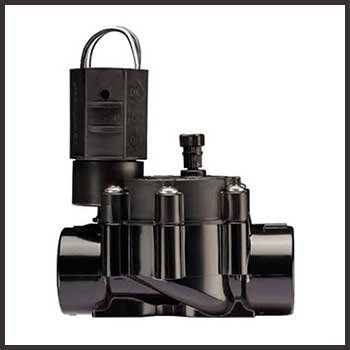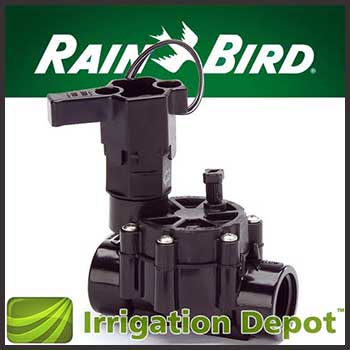When it comes to keeping your lawn and garden green and lush, having the right irrigation system is key. Two of the most popular irrigation valves on the market are the Rain Bird CP100 and DV100 models.
But what’s the difference between these two valves, and which one is right for your watering needs? We’ll compare the CP100 and DV100 head-to-head so you can make an informed decision.
A Brief Comparison Table
| Feature | Rain Bird CP100 | Rain Bird DV100 |
| Construction | Durable brass | Commercial grade bronze |
| Pressure Rating | 200 PSI max | 250 PSI max |
| Flow Rate | 5-150 GPM | 5-200 GPM |
| Bleed Screw | External manual | Internal manual |
| Bonnet | Threaded connection | Full threaded for servicing |
| Recommended Use | Residential zones | Large turf, high pressure |
| Price | $$$ | $$$$ |
Rain Bird CP100 Overview
The Rain Bird CP100 is a rugged and reliable electric remote control valve perfect for residential applications. This workhorse valve has been around for over 50 years and is a popular choice for its durable construction and consistent performance.

Here are some of the key features and benefits of the CP100 valve:
- Durable brass construction with thick walls resists corrosion
- Self-cleaning stainless steel flow control piston provides reliable and consistent water flow
- Manual bleed screw makes it easy to release pressure and clear debris
- Flow range of 5-150 GPM meets watering needs for most residential zones
- 200 PSI maximum pressure rating for flexibility in various water systems
- Compact size fits easily into valve boxes
The CP100 is designed to open and close quickly thanks to its 24VAC solenoid with 19-inch DCA wires. This allows for fast cycling between zones in your irrigation system. The valve body and bonnet are made of durable dezincification resistant brass for corrosion resistance.
Overall, the Rain Bird CP100 is a simple, rugged, and affordable electric valve perfect for basic watering needs. It’s easy to install, maintain, and repair.
Rain Bird DV100 Overview
The Rain Bird DV100 is also an electric remote control valve but is designed for more heavy-duty watering applications. It offers some upgraded features over the CP100.
Here are some of the key features and benefits of the DV100 valve:

- Commercial-grade bronze body withstands higher pressures up to 250 PSI
- Flow range of 5-200 GPM accommodates high flow demands
- Manual internal bleed makes opening the valve easy after winterization
- Full-flow design provides unobstructed water delivery
- 24VAC solenoid with 19-inch DCA wires for fast opening and closing
- Threaded bonnet design makes servicing the valve straightforward
The DV100’s heavy-duty bronze construction makes it more durable and able to handle higher water pressures than the CP100. This makes it a good choice for larger landscapes with greater water flow requirements. It also has a slightly higher flow rate capacity.
The full-flow design prevents obstruction inside the valve so water can pass through smoothly. And the DV100 adds an internal bleed screw for easy startup after winterization.
Overall, the DV100 is built for strength, durability, and maximum water flow for larger scale irrigation needs.
Also Read: Comparison Between Rain Bird 52SA and 5000
CP100 And DV100: Key Differences
Now that we’ve covered the basics of each valve, let’s compare them head-to-head:
Construction
- CP100: Durable brass body with flow control piston
- DV100: Commercial grade bronze body with full-flow design
The DV100 clearly wins when it comes to durability with its bronze construction able to handle more pressure.
Pressure Rating
- CP100: 200 PSI maximum
- DV100: 250 PSI maximum
Again, the DV100’s higher pressure rating makes it more versatile for high-pressure water systems.
Flow Rate
- CP100: 5-150 GPM
- DV100: 5-200 GPM
The DV100 accommodates more water flow, making it preferable for larger landscapes.
Bleed Screw
- CP100: Manual external bleed screw
- DV100: Internal bleed screw
The DV100 adds more convenience with its internal bleed screw that doesn’t require opening the valve.
Bonnet
- CP100: Threaded connection
- DV100: Full threaded bonnet for easy servicing
The DV100 makes it easier to access the interior components if repairs are needed.
Also Read: Comparison Among Hunter, Orbit And Rain Bird.
CP100 And DV100: Choosing The Right Valve
Based on the comparison, the Rain Bird DV100 is the clear choice if your landscape has high water flow demands, higher water pressure, and you want maximum durability.
However, the CP100 still works well for typical residential settings with standard water pressure and flow requirements. It provides reliable performance at a more affordable price point.
Here are some guidelines for choosing between the two Rain Bird valves:
- For basic residential zones like front yards and gardens, the CP100 will suffice
- For high-pressure municipal water systems, go with the DV100
- If you have zones with elevated flow rates above 150 GPM, the DV100 is better equipped
- For large turf zones like parks, sports fields, and golf courses choose the DV100
- If your valves will be difficult to access for service, the DV100 has a more convenient bonnet
Make sure to size your valves appropriately for the flow rate and pressure of each zone. And be sure to follow Rain Bird’s recommendations for proper installation.
Also Read: Choose Between Raindrip And Rainbird.
Frequently Asked Questions (FAQ)
In most cases, no. Replacing valve diaphragms requires using the specific replacement part recommended by the valve manufacturer. Using an incompatible diaphragm can lead to leaks or cause the valve to malfunction. Diaphragms are designed specifically to fit the valve body so it’s important to purchase the correct replacement.
Rain Bird valves are designed to operate on 24VAC (volts alternating current). They come with AC solenoids and are wired to AC timer controllers. Do not apply DC power which can burn out the solenoid.
It depends on the valve model. Entry-level residential valves like the CP100 are typically rated for up to 200 PSI maximum pressure. Heavy duty commercial valves like the DV100 can handle up to 250 PSI. Always check the valve’s specs to ensure your water pressure does not exceed the limit. Excess pressure can damage valves.
Most Rain Bird irrigation controllers provide a 24VAC output at the zone valves. This includes models like the ESP-LXME, ESP-TM2, ESP-RZX, and others. Verify your controller’s specs, but 24VAC is standard for operating compatible solenoid valves.
Also watch the video to know more!
In Conclusion
When choosing between the Rain Bird CP100 and DV100 irrigation valves, consider your water pressure, flow rate needs, valve accessibility, and budget. The DV100 is the most durable, high flow option, while the CP100 provides reliable performance at a lower cost.
Follow Rain Bird’s installation instructions for best results. Investing in quality irrigation valves will keep your lawn and garden thriving for years to come.
